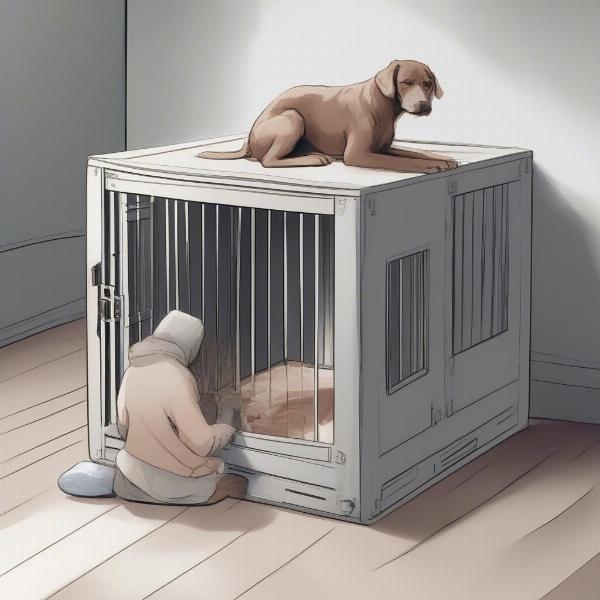Why does my dog cry at night? It’s a question that plagues many dog owners, causing sleepless nights for both humans and canines. A crying dog can be a sign of anything from a simple need like needing to go potty to more complex issues like anxiety or medical problems. Understanding the root cause is key to finding a solution and ensuring peaceful nights for everyone.
Common Reasons Why Your Dog Cries at Night
Several reasons can explain your dog’s nighttime serenades. Puppies often cry due to separation anxiety and being in a new environment. Older dogs may cry due to cognitive decline or discomfort from age-related ailments. Let’s delve deeper into some of the most common culprits:
Separation Anxiety
Many dogs, especially those recently adopted or rehomed, experience separation anxiety. Being left alone, especially at night, can trigger this anxiety, leading to crying, howling, and even destructive behaviors. Building a positive association with their sleeping area, like a crate or dog bed, can help. Consider leaving a worn t-shirt with your scent near them for comfort. For severe cases, a veterinarian may recommend medication or behavioral therapy.
Physical Discomfort
Pain or discomfort from an illness or injury can also cause your dog to cry at night. Arthritis, digestive issues, and even a full bladder can disrupt their sleep. If you suspect a medical issue, a visit to the veterinarian is essential.
Need for Potty Break
Sometimes, the reason is as simple as a full bladder. Especially with puppies or senior dogs, their bladder control may not be as strong. Establishing a regular potty routine before bed and ensuring easy access to water throughout the day can often resolve this issue.
How to Stop Your Dog from Crying at Night
Addressing your dog’s nighttime crying requires a multi-faceted approach. It involves understanding their needs, establishing a routine, and providing a comfortable and secure environment.
Create a Comfortable Sleeping Space
Ensure your dog has a cozy and safe sleeping area. This could be a dog beds puppies or a strong crates for dogs, depending on your dog’s preference and training. A comfortable temperature, minimal noise, and a familiar blanket or toy can help create a sense of security.
Establish a Bedtime Routine
A consistent bedtime routine signals to your dog that it’s time to settle down. This could include a short walk, a quick play session, and then a quiet period before bed. Consistency is key to reinforcing this routine and reducing anxiety.
 Owner comforting a crying dog at night
Owner comforting a crying dog at night
Ignore Attention-Seeking Behavior
If you suspect your dog is crying for attention, resist the urge to immediately respond. While it’s difficult to ignore a crying dog, giving in reinforces the behavior. Instead, wait until they quiet down before offering reassurance.
Expert Insights
Dr. Emily Carter, a renowned veterinary behaviorist, suggests, “Creating a predictable and calming environment is crucial for dogs who cry at night. Consistency in their routine and providing a safe space can significantly reduce anxiety.”
Adding to this, experienced dog trainer, Mark Johnson, advises, “Positive reinforcement through rewarding quiet behavior can be a powerful tool in training your dog to sleep through the night.”
Conclusion
Addressing your dog’s nighttime crying involves understanding the underlying cause and implementing appropriate solutions. By creating a comfortable and secure environment, establishing a consistent bedtime routine, and seeking professional guidance when needed, you can ensure peaceful nights for both you and your furry friend. Remember, patience and consistency are key to resolving this issue.
FAQ
- Why does my puppy cry so much at night? Puppies often cry due to separation anxiety, being in a new environment, and needing potty breaks.
- How can I tell if my dog is crying due to pain? Look for other signs like changes in appetite, lethargy, or difficulty moving.
- Should I ignore my dog when they cry at night? If the crying is attention-seeking, it’s best to ignore it until they quiet down.
- When should I consult a veterinarian about my dog’s crying? If the crying is persistent, accompanied by other symptoms, or if you suspect a medical issue, consult a vet.
- Can crate training help with nighttime crying? Yes, crate training can provide a sense of security and help establish a consistent bedtime routine.
- Is it normal for senior dogs to cry at night? Senior dogs can cry due to cognitive decline, pain, or needing more frequent potty breaks.
- What are some natural remedies for dog anxiety? Calming pheromone diffusers, anxiety vests, and specific calming music can sometimes help.
Further Reading
You might find these articles helpful: dog nursery
About ILM Dog
ILM Dog is your trusted international resource for all things dog-related. We provide expert advice on breeds, health, training, nutrition, grooming, and more, catering to both new and experienced dog owners worldwide. Whether you’re looking for guidance on choosing the right breed or need advice on senior dog care, our expert articles offer practical and reliable information to help you provide the best possible care for your canine companion. Contact us today for personalized support: Email: [email protected], Phone: +44 20-3965-8624.